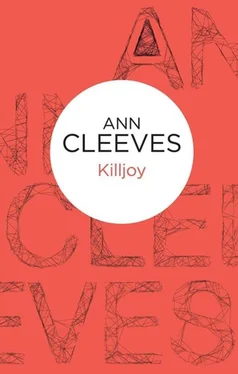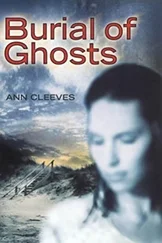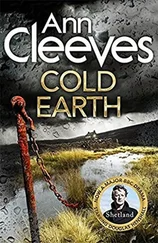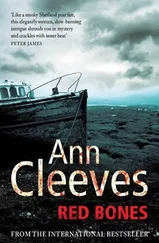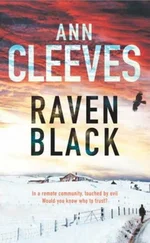Ann Cleeves - Killjoy
Здесь есть возможность читать онлайн «Ann Cleeves - Killjoy» весь текст электронной книги совершенно бесплатно (целиком полную версию без сокращений). В некоторых случаях можно слушать аудио, скачать через торрент в формате fb2 и присутствует краткое содержание. Жанр: Детектив, на английском языке. Описание произведения, (предисловие) а так же отзывы посетителей доступны на портале библиотеки ЛибКат.
- Название:Killjoy
- Автор:
- Жанр:
- Год:неизвестен
- ISBN:нет данных
- Рейтинг книги:5 / 5. Голосов: 1
-
Избранное:Добавить в избранное
- Отзывы:
-
Ваша оценка:
- 100
- 1
- 2
- 3
- 4
- 5
Killjoy: краткое содержание, описание и аннотация
Предлагаем к чтению аннотацию, описание, краткое содержание или предисловие (зависит от того, что написал сам автор книги «Killjoy»). Если вы не нашли необходимую информацию о книге — напишите в комментариях, мы постараемся отыскать её.
Killjoy — читать онлайн бесплатно полную книгу (весь текст) целиком
Ниже представлен текст книги, разбитый по страницам. Система сохранения места последней прочитанной страницы, позволяет с удобством читать онлайн бесплатно книгу «Killjoy», без необходимости каждый раз заново искать на чём Вы остановились. Поставьте закладку, и сможете в любой момент перейти на страницу, на которой закончили чтение.
Интервал:
Закладка:
‘Did Gabby know how her parents died?’ Hunter asked.
‘Not the details,’ Ellen said flatly. ‘Not from us.’
So, Ramsay thought, despite what the politicians and the media said, joy-riding wasn’t an invention of the nineties. Since the invention of the motor car there had always been foolish young men who drove too fast.
‘We won’t keep you,’ he said to Ellen. ‘If you wait in the lobby I’ll arrange for someone to give you a lift home. My sergeant will come with you and make sure we have your details.’
He was left alone then, in the cold impersonal room, with Prue Bennett and her daughter. He wanted to say something which would establish some real contact between them, to ask about Prue’s parents, to tell her about Diana and the divorce. But Prue had taken his last words as a general dismissal. She helped Anna to her feet and left the room without a word.
Chapter Four
When John Powell arrived home the house was empty. It occurred to him briefly that his mother was out a lot lately, but with the self-absorption of youth he only considered her absence as an effect on his own convenience. He had not eaten since lunch time and he was hungry. He was worried that the house might be cold.
The house was modern, detached, built at the end of a light-bulb-shaped close on a new housing estate. John hated it. His friends at the sixth-form college mocked him for living on the smart new estate. Most of them lived on the Starling Farm or in the terraced houses which spread from Hallowgate Front Street to the river. Some allotments and an adventure playground had been flattened to allow the new houses to be built-the council, poll-tax capped and almost insolvent, had reluctantly sold the land for private development-and feelings in the area had been high. There had been demonstrations and petitions.
Evan Powell had insisted on the move from the three-storeyed terrace house where John had spent his childhood. That part of Hallowgate wasn’t a good area to bring up a teenager, he said. There were too many distractions, too many temptations, the wrong sort of influence altogether. The new estate, called by the developers Barton Hill, would attract a different class of family. John would meet new friends, find new interests. And the move would be good for Jackie too. It would give her something to do, planning the decoration and the furniture. They could afford it after all since he had got his promotion.
As John approached the mock-Georgian front door the security light was switched on automatically. The white light threw a shadow behind him and made him blink. Its brightness still surprised him. He unlocked the door and went immediately to the downstairs cloakroom to switch off the burglar alarm. Bloody security, he thought. His father was obsessed with it. What have we got that’s worth stealing anyway? It’ll all be insured.
He threw his coat and bag on to the floor at the bottom of the stairs and prowled through to the kitchen looking for food. The house was, as always, immaculately tidy. The thick-pile carpet in the living room still lay in strips where it had been hoovered, like a closely mown cricket field, the glass-topped coffee-tables gleamed, the Dralon-covered sofa stood square to the wall. He thought again about his mother and wondered how she stood it on Barton Hill. At least in the old street there had been a bit of life and bustle. This was like a grave. And she wasn’t dumb. She had been training to be a teacher when Evan Powell, fresh from the valleys, had exerted his Celtic charm and swept her off her feet. So how did she put up with the tedium of housework? Her only social life seemed to consist of charity coffee mornings and parties organised in neighbours’ houses to sell imitation perfume. Soon he would be going away to college and then there would not even be his mess to clear away.
In the kitchen there was a note on the table and a meal for him to microwave. He studied the note with more interest than usual, hoping that his mother had found something more challenging to do with her time. But it said only: Babysitting at Joan’s.
Joan was his mother’s younger sister. She had two primary-aged children and it seemed to John that the cycle of domestic drudgery was simply continuing in a different place.
He had just put the meal into the microwave when the telephone rang. John felt a rush of adrenalin. He was expecting Connor to call. When he picked up the receiver his hand was shaking.
‘Can I speak to Evan, please?’ John recognized it as a colleague of his father’s and relaxed.
‘No,’ he said. ‘He’s not in yet. He’ll be back any time. He should be here by now.’
‘Ask him to phone work as soon as he gets in. It’s urgent.’
John replaced the receiver and heard the sound of his father’s car pulling into the drive.
He could tell as soon as his father came in to the room that he was irritable and he moved immediately to the offensive.
‘Where have you been then?’ he demanded. ‘I didn’t see your car at the Centre. I had to walk home.’
‘I was there!’ Evan Powell said, but he was relieved that his son had an adequate excuse for not meeting him. He always wanted to believe the best of him. ‘I had to park round the corner. I was in your mother’s car. You know that. I waited for you in the cafeteria. I thought you usually went for a drink after rehearsal.’
‘Yeah!’ John said. ‘I usually do, but not tonight…’ He played his trump card. ‘Too much homework.’
He saw his father relax, proud that his son made time for homework, glad that he wasn’t one of the young tearaways who stole cars for kicks.
‘There’s just been a phone call for you,’ John said, pressing home his advantage, hoping to avoid further questions. ‘It was work. They want you to phone in as soon as you can.’
‘Right… Well… OK. I’ll not keep you from your homework.’
His father used the telephone in the sitting room so John, eating lasagne and reading the evening paper in the kitchen, did not overhear the conversation. But his father, shocked by the coincidence that a body had been found at the Grace Darling Centre, returned immediately to tell him the news. He was surprised by the boy’s reaction to Gabriella’s death. John said nothing. He disappeared to his room and Evan did not see him again all evening.
The police offered Gus Lynch a lift home-of course they would need to keep his Volvo, they said, for forensic tests. He declined the offer and took a bus, going the long way avoiding the Starling Farm estate. It was a precaution he had taken since the disturbances began. He was terrified of physical violence and had nightmares about it. He lived by the Tyne in a building that had once been a chandler’s shop. The fog lingered over the river softening the outlines of the ice factory and the new fish market. Gus was pleased with his flat on the quay. He had been lucky to get it. With the decline of the fishing fleet, the chandlery business, which sold everything from creosote to jerseys, had gone bankrupt and an enterprising architect had bought the building and converted it to flats. The area was not as fashionable as the Newcastle quayside where warehouses had been transformed into luxury apartments and wine bars had appeared on every street corner. It still smelled of fish. All the same Gus thought the flat was an investment and it would not be long before other developers discovered the fish quay too.
As he drew closer he looked up and saw that there was a light in his flat.
Shit, he thought. He should never have given her those keys. He had presumed that when he was late she would go away. His flat was on the first floor, up wooden steps from the outside of the building. Jackie must have been looking out for him, or she heard his feet on the steps, because she had the door open before he reached it.
Читать дальшеИнтервал:
Закладка:
Похожие книги на «Killjoy»
Представляем Вашему вниманию похожие книги на «Killjoy» списком для выбора. Мы отобрали схожую по названию и смыслу литературу в надежде предоставить читателям больше вариантов отыскать новые, интересные, ещё непрочитанные произведения.
Обсуждение, отзывы о книге «Killjoy» и просто собственные мнения читателей. Оставьте ваши комментарии, напишите, что Вы думаете о произведении, его смысле или главных героях. Укажите что конкретно понравилось, а что нет, и почему Вы так считаете.
